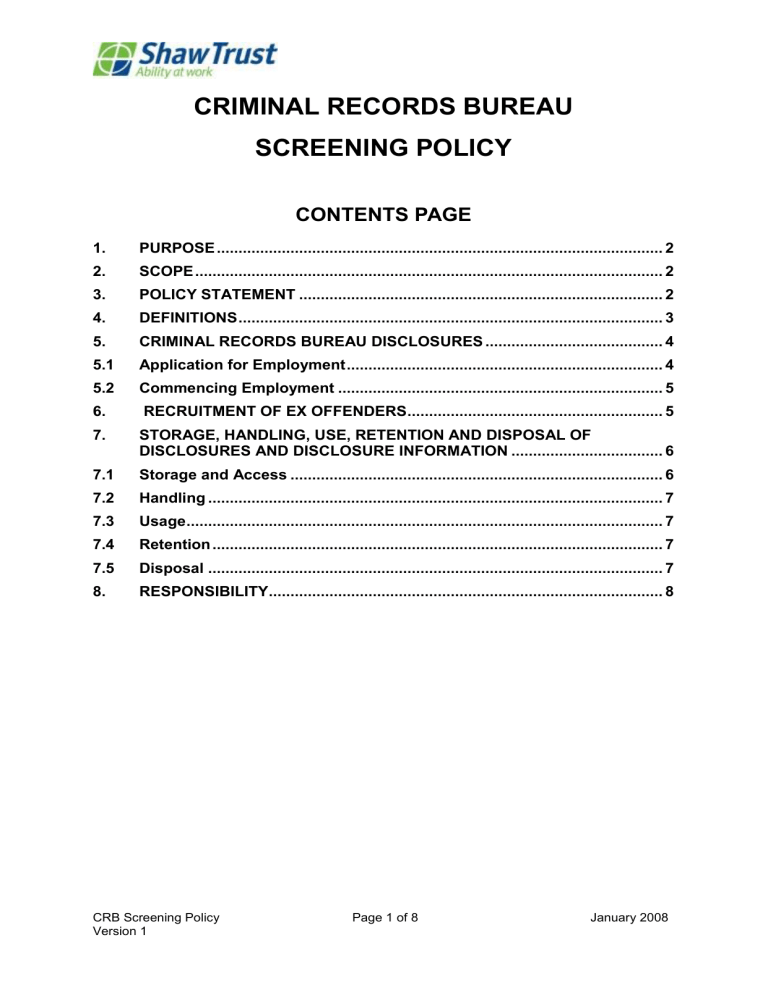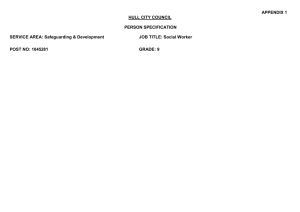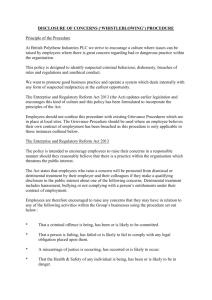RECRUITMENT OF EX-OFFENDERS POLICY

CRIMINAL RECORDS BUREAU
SCREENING POLICY
CONTENTS PAGE
CRIMINAL RECORDS BUREAU DISCLOSURES ......................................... 4
Commencing Employment ........................................................................... 5
RECRUITMENT OF EX OFFENDERS ........................................................... 5
7. STORAGE, HANDLING, USE, RETENTION AND DISPOSAL OF
DISCLOSURES AND DISCLOSURE INFORMATION ................................... 6
CRB Screening Policy
Version 1
Page 1 of 8 January 2008
CRIMINAL RECORDS BUREAU
SCREENING POLICY
If you require this document in an alternative format please contact the Human
Resources Department.
1. PURPOSE
To provide details of the Criminal Records Bureau (CRB) Disclosure screening process within Shaw Trust for positions involving regular contact with young people or a vulnerable client group. It also contains a policy statement on the recruitment of ex offenders and the correct handling and safekeeping of disclosure information.
This policy should be read in conjunction the Recruitment and Selection Policy.
This policy is for guidance only and does not form part of your contract of employment. Employees should familiarise themselves with the provisions of this policy. The company may deviate from or make amendments to this set policy from time to time and at its sole discretion where the result in treatment to the employee is no less fair or where it is appropriate in the circumstances of the case. This policy may also be discontinued if it becomes impracticable for either party to continue with it.
2. SCOPE
All applicants for relevant established, voluntary or temporary employment, as detailed in this policy, and all existing employees who are being transferred to relevant employment from other duties, irrespective of previous positions held.
3. POLICY STATEMENT
Due to the nature of our organisation, there are certain jobs or areas where in depth vetting and verification are required, this will involve CRB checks. As an organisation using the CRB Disclosure service to assess applicants’ suitability for positions of trust, Shaw Trust complies fully with the CRB Code of Practice and undertakes to treat all applicants for positions fairly. It undertakes not to discriminate unfairly against any subject of a Disclosure on the basis of a conviction or other information revealed. A copy of the CRB Code of Practice can be obtained from the
Human Resource Department.
CRB Screening Policy
Version 1
Page 2 of 8 January 2008
If the post is not working with children or vulnerable adults, Shaw Trust will only require applicants to disclose ‘unspent’ criminal convictions as part of their application.
Shaw Trust will advise applicants at the time when they first submit their application, the extent and depth of the vetting they will be subjected to, before the role can be offered to them. This will enable any person who objects to the vetting process, for whatever reason, to withdraw their application early on in the recruitment process. Successful applicants will be required to consent to subsequent criminal record checks during employment as deemed appropriate by
Shaw Trust or regulatory bodies.
4. DEFINITIONS
4.1 Rehabilitation of Offenders Act 1974
The Rehabilitation of Offenders Act 1974 provides that ex-offenders are not required to disclose to prospective employers, convictions defined as ‘spent’ under the Act.
The Act defines time periods after which different types of convictions become spent.
It also makes it illegal for employers to discriminate against an ex offender on the grounds of a spent conviction. In addition to the above, the fact that a person has a spent conviction (as per the Rehabilitation of Offenders Act 1974) will not be grounds for Shaw Trust refusing to engage that person, unless the person is applying for a position involving regular contact with young people or a vulnerable client group to which the Exceptions Order to the Act applies.
4.2 Rehabilitation of Offenders Act 1974 (Exceptions) (Amendment) Order
2002
Shaw Trust is exempt from the provisions of the Rehabilitation of Offenders Act 1974 by virtue of the Rehabilitation of Offenders Act 1974 (Exceptions) (Amendment)
Order 2002 for positions involving regular contact with young people or a vulnerable client group. Applicants for these positions are not therefore statutorily excused from the obligation to disclose spent convictions where a question is asked in order to assess their suitability for work. Failure to disclose a spent conviction will be considered proper grounds for that person to be refused employment or engagement.
Two CRB checks are available in cases where an employer is entitled to ask exempted questions under the Exceptions Order to the Rehabilitation of Offenders
Act (ROA) 1974:
4.2.1 Standard Disclosure
This is primarily for positions that involve regular contact with children or vulnerable adults. Standard Disclosures show current and spent convictions, cautions, reprimands and warnings held on the Police National Computer. If a position involves working with children, the CRB check will indicate whether information is
CRB Screening Policy
Version 1
Page 3 of 8 January 2008
held on three government lists of those who are banned from working with children or the vulnerable.
4.2.2 Enhanced Disclosure
An Enhanced Disclosure is for posts involving greater contact with children or vulnerable adults and may involve regular care for, supervising, training or being in contact of such people. This level of check involves an additional level of check to the Standard Disclosure. Where local police records contain additional information that may be relevant to the post the applicant is being considered for, the Chief
Officer of police may release information for inclusion in an Enhanced check.
5. CRIMINAL RECORDS BUREAU DISCLOSURES
For posts working with children or vulnerable adults or those in positions of trust, all convictions must be declared, as applicants who are to be offered positions within the Shaw Trust will be subject to a request for a Criminal Records Bureau (CRB)
Disclosure. The type of Disclosure (i.e. Enhanced or Standard) will depend upon the nature of the position offered. This is to enable Shaw Trust to make more informed recruitment decisions. If an employee acquires a criminal conviction during the course of their employment then they are obliged to declare it immediately to their line manager.
Shaw Trust is a Registered Body for the purposes of applying to the CRB for
Disclosures, and under this process, the Chief Officer
– People and Performance has overall responsibility (i.e. is the “Lead Countersignatory”), and members of the
Human Resource Department are also able to countersign applications for
Disclosures (i.e. is a “Countersignatory”). Shaw Trust will at all times comply with the obligations of the CRB’s Code of Practice.
Criminal Records Bureau Disclosures will be renewed every three years.
5.1 Application for Employment
All applicants for vacancies will be required to complete and sign S haw Trust’s
Application Form as detailed in the Recruitment and Selection Policy. The
Application Form contains an acknowledgement that misrepresentation or failure to disclose material facts will constitute grounds for dismissal or withdrawal of offer of employment.
CRB Screening Policy
Version 1
Page 4 of 8 January 2008
Applicants may also be asked to provide information which can only be supplied by them (ie for CRB Disclosures). In this event, particular care will be taken to ensure that the information supplied is genuine and accurate.
5.2 Commencing Employment or Voluntary work
If an employee/volunteer is commencing their employment/voluntary placement before the CRB screening process has been concluded and the results judged to be satisfactory, managers are responsible for ensuring that close supervision is observed at all times.
In no circumstances will employment or a voluntary placement be confirmed or the screening process be considered to be complete until written confirmation of all checks has been received. All offers of employment and voluntary placements are made subject to this condition.
6. RECRUITMENT OF EX OFFENDERS
The Rehabilitation of Offenders Act 1974 provides that ex-offenders are not required to disclose to prospective employers, convictions defined as ‘spent’ under the Act
(unless the post is covered by the Exceptions Order, see point 4.2). The Act defines time periods after which different types of convictions become spent. It also makes it illegal for employers to discriminate against an ex offender on the grounds of a spent conviction.
Shaw Trust demonstrates its commitment to the fair treatment of its staff, potential staff or users of its services, as stated in the Equality and Diversity Policy, by:
making this Policy available, on request, to all Disclosure Applicants at the outset of the recruitment process.
actively promoting equality of opportunity for all with the right mix of talent, skills and potential and welcome applications from a wide range of candidates, including those with criminal records. We select all candidates for interview based on their skills, qualifications and experience.
For those positions where a Disclosure is required, all application forms, job adverts and recruitment details will contain a statement that a Disclosure will be requested in the event of the individual being offered the position.
Where a Disclosure is to form part of the recruitment process, candidates will be required to provide details of their criminal record with the initial application.
We guarantee that this information is only seen by those who need to see it as part of the recruitment process.
CRB Screening Policy
Version 1
Page 5 of 8 January 2008
Unless the nature of the position allows Shaw Trust to ask questions about your entire criminal record, we only ask about ‘unspent’ convictions as defined in the Rehabilitation of Offenders Act 1974.
Ensuring that all those in Shaw Trust who are involved in the recruitment process have been suitably trained to identify and assess the relevance and circumstances of offences. We also ensure that they have received appropriate guidance and training in the relevant legislation relating to the employment of ex-offenders, eg the Rehabilitation of Offenders Act 1974.
At interview, or in a separate discussion, we ensure that an open and measured discussion takes place on the subject of any offences or other matter that might be relevant to the position. Failure to reveal information that is directly relevant to the position sought could lead to the withdrawal of an offer of employment.
Making every subject of a CRB Disclosure aware of the existence of the CRB
Code of Practice and making a copy available on request.
Undertaking to discuss any matter revealed in a Disclosure with the person seeking the position before withdrawing a conditional offer of employment.
Having a criminal record will not necessarily bar an individual from working with the
Shaw Trust. This will depend on the nature of the position and the circumstances and background of the offence(s) and the relevance to the post in question.
7. STORAGE, HANDLING, USE, RETENTION AND DISPOSAL OF
DISCLOSURES AND DISCLOSURE INFORMATION
As an organisation using the Criminal Records Bureau (CRB) Disclosure Service,
Shaw Trust complies fully with the CRB Code of Practice regarding the correct handling, use and storage, retention and disposal of Disclosures and Disclosure
Information. It also complies fully with its obligations under the Data Protection Act
(Data Protection Policy) and other relevant legislation pertaining to the safe handling, use, storage, retention and disposal of Disclosure information.
7.1 Storage and Access
Disclosure information is never kept on an applicant’s personnel file, but is kept separately and securely in a lockable cabinet controlled and limited to those who are entitled to see it as part of their duties. A record will be maintained of all those to whom disclosure information has been revealed.
CRB Screening Policy
Version 1
Page 6 of 8 January 2008
7.2 Handling
In accordance with section 124 of the Police Act 1997, Disclosure information is only passed to those who are authorised to receive it in the course of their duties. We maintain a record of all those to whom Disclosures or Disclosure information has been revealed and we recognise that it is a criminal offence to pass this information to anyone who is not entitled to receive it.
7.3 Usage
Disclosure information is only used for the specific purpose for which it was requested and for which the applicant’s full consent has been given.
7.4 Retention
Once a recruitment decision has been made, we do not keep Disclosure information for any longer than is absolutely necessary. This is generally for a period of up to six months, to all for the consideration and resolution of any disputes or complaints. If, in very exceptional circumstances, it is considered necessary to keep Disclosure information for longer than six months, we will consult the CRB about this and will give full consideration to the Data Protection and Human Rights of the individual.
Throughout this time, the usual conditions regarding safe storage and strictly controlled access will prevail.
7.5 Disposal
Once the retention period has elapsed, any Disclosure Information will be immediately destroyed by secure means, i.e. by shredding. Photocopies or other image of the Disclosure or any copy or representation of the contents of a Disclosure will also be destroyed. However, Human Resource Department will maintain a record of the following information relating to the Disclosure:
Date of issue.
Name of the subject.
Type (Standard, Enhanced).
Position for which the Disclosure was requested.
Unique reference number.
Recruitment decision taken.
CRB Screening Policy
Version 1
Page 7 of 8 January 2008
8. RESPONSIBILITY
All those persons referred to within the scope of this policy are required to be familiar with the terms of this policy.
Individual managers are responsible for ensuring that this policy is applied within their own area. Any queries on the application or interpretation of this policy must be discussed with the Human Resources Department prior to any action being taken.
The Human Resources Department has the responsibility for ensuring the maintenance, regular review and updating of this policy. Revisions, amendments or alterations to the policy can only be implemented following consideration and approval by the Chief Officer, People and Performance.
CRB Screening Policy
Version 1
Page 8 of 8 January 2008


